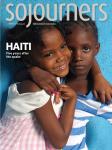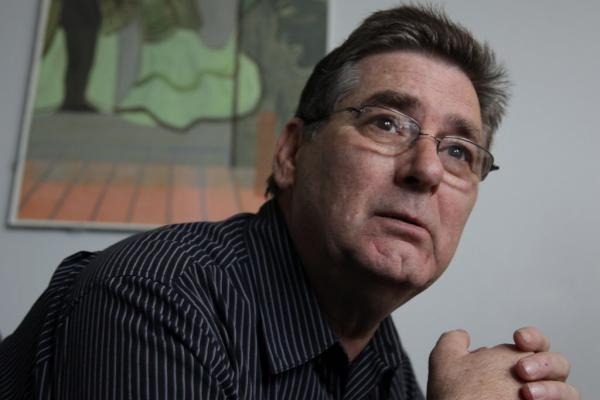POET BRUCE WEIGL inhabits two places in his life, in his work. Two places that could not be more different. But in the course of our conversations, I come to think of them as a single place, the way two hands are part of a single body. One place is Lorain, Ohio. The other is Vietnam.
Ever since the Vietnam War ended, the life of this mill worker’s son has swung between those two far-flung poles.
I met Weigl at a Starbucks in Manhattan’s East Village. I was interviewing a friend of his, Adrie Kusserow, about her book of poems on South Sudan. Weigl was content just to drink his coffee and listen to us talk. He intervened only once, when Kusserow and I began decrying public indifference to South Sudan’s pre-independence history of slaughter, enslavement, and banishment by Sudan.
“If I may defend my fellow human beings here, there are so many places in the world today where there is suffering. It is understandable that people may miss one or two,” he said.
The suffering of the Vietnamese, and of soldiers like himself who fought in Vietnam, is still burned into his psyche like some gory tattoo. It is to be found in every one of his 13 books.
In his poem “Ice Storm,” from The Abundance of Nothing (TriQuarterly Books), short-listed for the 2013 Pulitzer Prize, he writes:
I got my own personal Jacob’s ladder,
buddy, reader, listener to this
sad song. I built a temple for the ghosts
because they just kept coming.
Weigl’s work is strewn with ghosts: ghosts of Vietnamese children hit by American fire (but also the cherished non-ghost, his adopted Vietnamese daughter, Hahn), the ghosts of a soldier’s legs severed by a Bouncing Betty, the ghost of his own lost self, inflicted miserably on bar girls. He constructs a stairway of ghosts that empties into a redemptive space. A space that has prevailed over the ghosts, while being unable to actually evict them.
Sometimes, in Vietnam, he’d float into the strange contemplative space of Buddhist monks. Saffron flares radiating peace in the jaws of war. “They did not teach us / the words for prayer or for peace,” he wrote, but their presence taught him such things were possible.
Years later, in Boston, he met his teacher, Vietnamese monk Nguyen Ba Chung, who told him that if he wanted to become a Buddhist, he should stop reading about Buddhism and start practicing it. He began practicing meditation, walking the path of nonviolence.
He’s been back to Vietnam a dozen times since the war. (I think of a human moth returning to the flame that consumed its spirit.) He speaks Vietnamese with a Hanoi accent. He translates Vietnamese poets into English, and teaches them to his students, first at Penn State, now at Lorain County Community College. “I died in Vietnam, and was reborn in poetry,” he likes to say.
Through the dark tenements and
fallen temples
we wander into Old Hanoi,
oil lamps glowing in small
storefronts and restaurants
where those, so long ago my enemy,
sit on low chairs and praise the simple evening.
—“Dialectical Materialism,” from Song of Napalm (Atlantic Monthly Press)
“IT WAS STRANGE returning to Lorain,” he admits. “Being dropped back there as if everything was still the same. No one talked about PTSD back then, and no one wanted to talk about it. And those of us who wanted to get involved with the anti-war movement found that those people didn’t trust us either.”
As one of “those people,” I stand chastened. Our idea of borders was as unbending as those who insisted that North Vietnam and South Vietnam were separate countries. The U.S. soldier stood on the wrong side of our border.
Despite the inner bedlam of flashbacks, drugs, and alcohol, Weigl was unable to sever ties with Lorain. Leaving his hometown forever would have been easy, he admits.
“What made you stay?”
“The first poets who caught my eye early on were James Wright (from Martins Ferry, Ohio) and Philip Levine (from Detroit). I saw how they made a kind of beauty out of the wreckage of the industrial city. Wright’s poems taught me that you didn’t have to grow up in the Shenandoah Valley to write about where you grew up. If it was the steel mills or the slag heaps, that was your landscape. You don’t have to change your birthplace for another place.”
He somehow managed to keep intact his stubbornly held sense of place, family, and family history.
I think of the mystery of stability within instability. I think of the flinty gratitude of Weigl’s Lorain poetry.
Around hot steel these men twisted bands
until their fingers would not open in the morning,
and in my hungry brain
a spirit recalls my father,
home from the mill in his white T-shirt
like a god
and the smell of the mill all over his body
and the taste of his delicious sweat.
—“Why We Are Forgiven,” from What Saves Us (TriQuarterly Books)
IT’S NOT AS IF Weigl deliberately returned to Vietnam to find what was missing in his life. Or to find anything in particular, for that matter. His first visit back, in 1986, was wholly unpremeditated. Tom Nussbaumer, with whom he edited the anti-interventionist Intervention Magazine, had been invited to Hanoi by a Vietnamese general. Nussbaumer, in turn, invited Weigl.
They were herded from their hotel to orphanages by government minders, as Vietnam had yet to officially open its doors to Western visitors.
But even after that first visit, Weigl noticed one important change. “The nightmares I had been having about Vietnam two or three times a week suddenly stopped. I replaced bad memories with good ones, memories of war with memories of children playing in the street. It was like having a switch turned off in your brain. I was amazed that kind of thing could happen.”
When the poet speaks of his second life among the Vietnamese, and his links with them, he speaks of it as casually as he might a trip to the store. Perhaps he doesn’t want me making some big hagiographic deal out of it.
On that first trip over, Weigl was introduced to Miss Tao in Ho Chi Minh City. She had been imprisoned for a year during the war in one of South Vietnam’s infamous “tiger cages,” where she was exposed to the heat and the rain and had quicklime poured on her. It’s been years since I thought of the tiger cages. Back in the early ’70s, they were splashed across the front pages of The New York Times with the same lurid headlines that later escorted Abu Ghraib and waterboarding into U.S. consciousness.
“While she was telling her story, every once in a while she would cringe. I’d say something stupid: ‘It must seem like yesterday.’ She corrected me, ‘No, like today.’ It was the first time I had met someone who was tortured by the South Vietnamese forces. It opened my mind, made me realize it was being done, if not under the guidance, at least under the protection of the U.S. To look at Miss Tao, and to imagine what she had to go through, gave me an understanding of the world, and my place in it, that I never had before.”
He never saw Miss Tao again. He didn’t have to. She was the new “lens” through which he saw the world.
In 1990, with restrictions eased under Hanoi’s Open Door policy, Weigl began meeting with Vietnamese poets, who he found were also writing about the war. “They had suffered in the war just as I had suffered.”
“Did they ever ask you about the war, and what you did in the war?”
“They were careful about questions like that. They were curious, but they were not accusatory. They understood that when you are a soldier, you are sent to war. That’s what soldiers do. Afterward, you can be friends. Our relationship was more about poetry than about the war. When you love poetry, it transforms how you relate to each other; it creates a bond.”
Part of the bond one feels with Weigl is that he gets you asking questions you don’t usually ask: How can people marginalize memories of napalm, carpet bombing, and Agent Orange and befriend a doubtlessly decent man, but one whose country’s army left behind perhaps 2 million dead Vietnamese? Is forgiveness, apart from the action of the spiritually awakened heart, a genetic predisposition with which some cultures are blessed?
Weigl is able to share with his students at Lorain the results of a strange literary unearthing. In the early ’90s, working at the William Joiner Institute for the Study of War and Social Consequences at UMass, he was handed a rolled-up, nine-and-a-half-mile-long piece of microfiche containing documents taken from the dead bodies of Viet Cong and North Vietnamese soldiers.
“I went to the library with a Vietnamese woman who was working at the institute, and we had a look. Along with the diaries and maps, I saw something that looked like poems. ‘What are poems doing here?’ I asked her. She said, ‘Soldiers in the field, away from home, often wrote poems.’”
The poems became a book, Poems from Captured Documents, that Weigl translated and the University of Massachusetts Press published.
I ask him about his students’ reactions to the poems. His normally low voice shoots up an octave:
“They react pretty much as I reacted: The Vietnamese soldiers sound to them an awful lot like our own. They miss their families. They sound exhausted from fighting. The ‘enemy,’ from the U.S. point of view, was dehumanized as much as possible. This is a kind of reconciliation, a literary reconciliation.”
Weigl points out that his students at Lorain are working-class kids like himself. They understand that wars are fought by working-class people, and they themselves know or know of people who fought in Vietnam.
Lorain itself is a “veteran friendly” community college, with a veterans’ lounge that provides a private space to accommodate their private pain. Weigl is the adviser for the students’ veterans club on campus. His anti-war politics do not play well with Iraqi and Afghan war vets.
“Many of them are very gung-ho. I have been working with veterans for over 20 years, but it’s still difficult to adapt to guys like that. The politics comes up. Everything I do and think about is in some way related to my politics. But my job is to teach them writing. As a Buddhist, I also try to teach compassion. It’s important to remember that the level of atrocities in their wars has been really higher than ours. Consequently, the problems with PTSD are going to be worse.”
Weigl’s later poems bear the happier markings of hard-won serenity: “I think I’ll put my pencil down / so I can walk all through these slender winter shadows.” But in his early poems especially, I come across many lines that might be the spawn of PTSD. For example, this from “Mines,” a poem from A Romance (University of Pittsburgh Press), one of his first volumes:
A Bouncing Betty comes up waist high—
cuts you in half.
One man’s legs were laid
Alongside him in the Dustoff,
he asked for a chairback, morphine,
he screamed he wanted to give
his eyes away, his kidneys,
his heart...
The heart that was seeded in Lorain and lost in Vietnam, that was reborn in different ways in Middle America and in Southeast Asia, is the heart of poetry.

Got something to say about what you're reading? We value your feedback!
